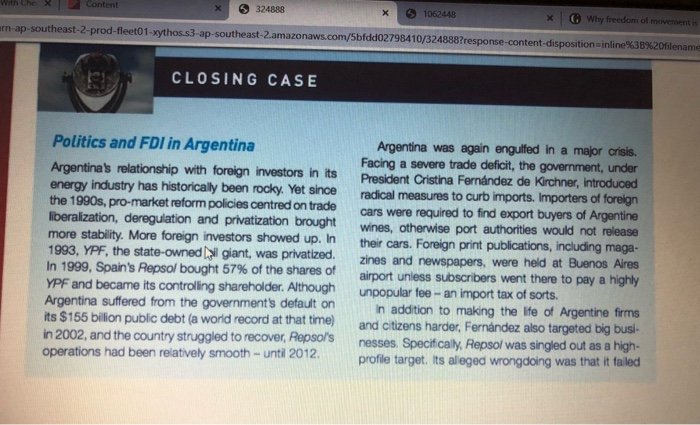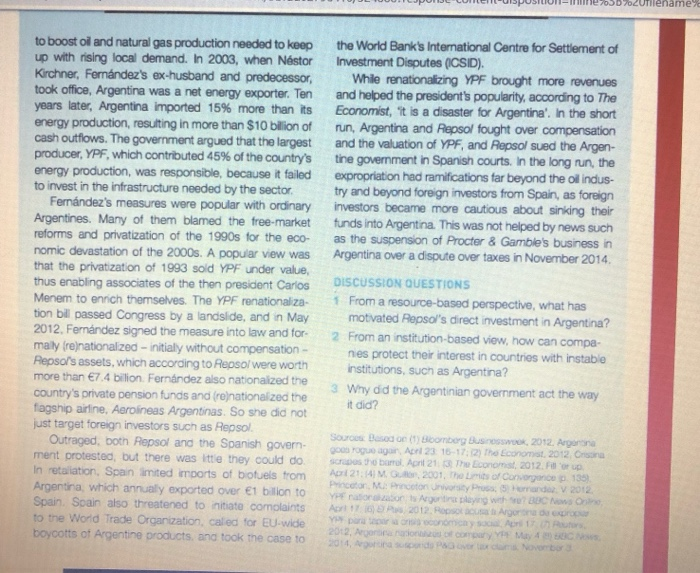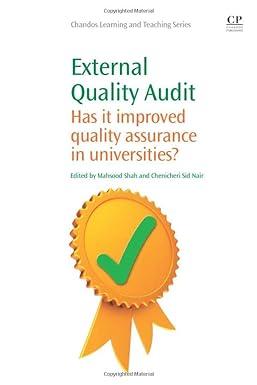Some trade unions fear that free movement of people depresses wages of ordinary workers because immigrants from other European countries are willing to work for lower wages. Should the free movement of people be restricted for some countries, or for some certain time period?
> 324888 x 1062448 * Why freedom of movement n-ap-southeast-2-prod-fleet01-Xythos.s3-ap-southeast-2.amazonaws.com/5bfdd02798410/324888?response content dispositioninline %20enam CLOSING CASE Politics and FDI in Argentina Argentina's relationship with foreign investors in its energy industry has historically been rocky. Yet since the 1990s, pro-market reform policies centred on trade liberalization, deregulation and privatization brought more stability. More foreign investors showed up. In 1993, YPF, the state-owned il giant, was privatized. In 1999, Spain's Repsol bought 57% of the shares of YPF and became its controlling shareholder. Although Argentina suffered from the government's default on its $155 billion public debt (a world record at that time) in 2002, and the country struggled to recover, Repsol's operations had been relatively smooth - until 2012 Argentina was again engulfed in a major crisis. Facing a severe trade deficit, the government, under President Cristina Fernndez de Kirchner, Introduced radical measures to curb imports. Importers of foreign cars were required to find export buyers of Argentine wines, otherwise port authorities would not release their cars. Foreign print publications, including maga- zines and newspapers, were held at Buenos Aires airport unless subscribers went there to pay a highly unpopular fee - an import tax of sorts. In addition to making the ite of Argentine firms and citizens harder, Fernndez also targeted big busi- nesses. Specifically, Repsol was singled out as a high- profile target. Its alleged wrongdoing was that it failed the World Bank's International Centre for Settlement of Investment Disputes (OSID). While renationalizing YPF brought more revenues and helped the president's popularity, according to The Economist, it is a disaster for Argentina'. In the short run, Argentina and Repsol fought over compensation and the valuation of YPF, and Repsol sued the Argen- tine government in Spanish courts. In the long run, the expropriation had ramifications far beyond the oil indus- try and beyond foreign investors from Spain, as foreign investors became more cautious about sinking their funds into Argentina. This was not helped by news such as the suspension of Procter & Gamble's business in Argentina over a dispute over taxes in November 2014 to boost oil and natural gas production needed to keep up with rising local demand. In 2003, when Nstor Kirchner, Fernndez's ex-husband and predecessor, took office, Argentina was a net energy exporter. Ten years later, Argentina imported 15% more than its energy production, resulting in more than $10 billion of cash outflows. The government argued that the largest producer, YPF, which contributed 45% of the country's energy production, was responsible, because it failed to invest in the infrastructure needed by the sector Fernndez's measures were popular with ordinary Argentines. Many of them blamed the free-market of the 1990s for the eco- nomic devastation of the 2000s. A popular view was that the privatization of 1993 sold YPF under value, thus enabling associates of the then president Carlos Menem to enrich themselves. The YPF renationaliza- tion bll passed Congress by a landslide, and in May 2012. Fernndez signed the measure into law and for mally (re)nationalized - initialy without compensation - Repsol's assets, which according to Repsol were worth more than 7.4 bilion. Fernndez also nationalzed the country's private pension funds and (re)nationalized the flagship airline, Aerolineas Argentinas. So she did not just target foreign investors such as Repsol Outraged, both Repsol and the Spanish govern. ment protested, but there was ittle they could do In retallation. Span imited moorts of botuels from Argentina, which annualy exported over E1 bilion to Spain Spain also threatened to initiate complaints to the World Trade Organization caled for EU-wide boycotts of Argentine products and took the case 10 DISCUSSION QUESTIONS From a resource-based perspective, what has motivated Repsol's direct investment in Argentina? 2 From an institution-based view, how can compa nes protect their interest in countries with instable institutions, such as Argentina? 3 Why did the Argentinian government act the way it did? Sort Bod bomberg Bus 2012. Argerne rogue dgan Ahl 23. 16-172) The Economat 2012. Con c esto borrol Act 21 3 The Economist, 2012. FOOD AT21:44M 2001 Thors of Convergence p135 Yra Aort 10 Ayurtra plyng weh BBC One AN 2012. Popsol souna Argorona de expropus








